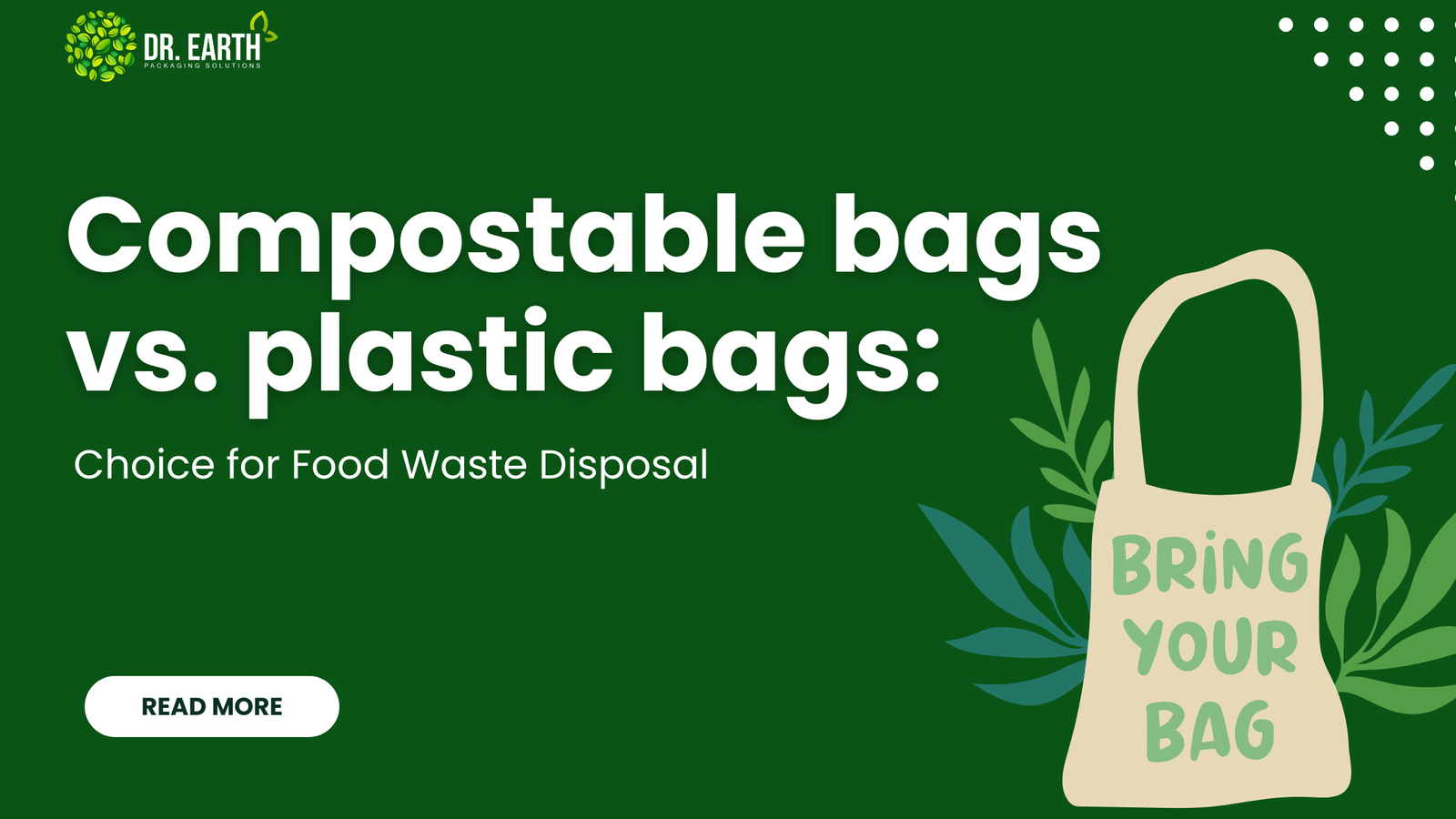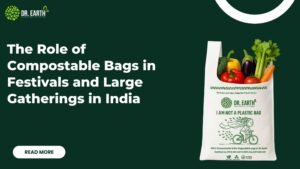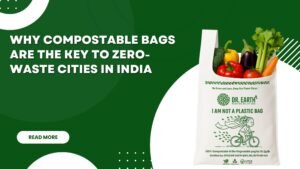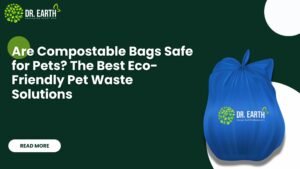
In a world where more emphasis is being laid on environmental sustainability, making a move away from plastics is definitely more necessary than ever. Once regarded as the backbone for grocery bags and other miscellaneous products, plastic bags are fast becoming the primary cause of polluting the environment. In the eyes of the world as it sees the future of the planet, an eco-friendly alternative has found attention as a practical move—a compostable bag.
A blog on a journey with the numerous reasons why compostable bags are the best alternative to the traditional plastic bags in terms of environmental advantages, safety, strength, and also cost-effectiveness. Let us see why it is one of the best decisions you can make for your health and the environment by switching to compostable bags.
The Environmental Impact of Plastic Bags
Plastic bags are invisible in every detail of daily life, but the bags are mostly use for shopping, carrying groceries or transporting all sorts of goods. However, these bags pose serious problems to the environment. Produced from polyethylene, a petroleum-based plastic, plastic bags do not biodegrade; hundreds of years may pass before these plastic bags decompose in landfills or the natural environment. Instead of degrading, plastic bags fragment into smaller pieces called microplastics. These pieces continue to exist and contaminate our oceans, rivers, and other ecosystems.
The production of plastic bags is also very costly in terms of the environment. Plastic bags are made from fossil fuels; therefore, these contribute to air and water pollution, greenhouse gases, and the depletion of scarce non-renewable resources. Such large-scale usage of plastic bags globally has resulted in plastic waste becoming one of the pressing issues today.
The Key Environmental Drawbacks of Plastic Bags:
- Non-Biodegradable: Plastic bags take hundreds of years to decompose.
- Microplastic Pollution: During decomposition, plastic bags produce small pieces of plastics that infect the ecosystem.
- Damage to Wildlife Animals and other animals mistake the plastic bags for food, which causes injuries or deaths to them
- High Carbon Footprint: The process of its production is resource-intensive and harmful to the environment.
What Are Compostable Bags?
Compostable bags are the greener counterpart of plastic bagging. Composed of natural materials, like cornstarch, sugarcane, or potato starch, this product can break down naturally within a composting environment. Rather than toxic residues or microplastics being left behind, these tend to biodegrade into organic matter.
Unlike plastic bags, which last for hundreds of years in the environment, the bags are designed to biodegrade within just a few months if exposed to favorable conditions, which may be available in an industrial composting facility or even a home compost bin. The organic residues resulting from the breakdown can then be returned to soil to prepare nutrient-rich soil, thus opening avenues for closing the loop by turning waste into wealth.
Compostable bags are made from plant-based, renewable resources, meaning their production is not dependent on fossil fuel, and they have a much smaller carbon footprint than plastic bags.
The key benefits of compostable bags:
- Biodegradable: It breaks down into organic matter that can be use to enrich soil .
- Made from Renewable Resources: From material produced by plants such as cornstarch, sugarcane, or potato starch.
- Eco-Friendly Production: The production used less energy and less resource than plastic bags.
Comparing Compostable Bags to Plastic Bags
The decision between using compostable bags versus plastic ones depends on four critical factors: environmental impact, health safety, strength, and general cost. Let us have a closer look at each of these factors to know why such an alternative offered in compostable bags is so attractive.
1. Environmental Impact
There is no doubt that compostable bags are better for the environment than plastic ones. As noted above, plastic bags have a notoriously long decomposition time that leads to pollution. They often end up in landfills, oceans, and forests, where they may take hundreds of years to break down.
On the other hand, compostable bags are made to decompose within a period of months. They break down under the right composting conditions into non-toxic substances that can be used to feed the soil. This is not only an act of preventing pollution but also helping to create nutrient-rich compost that reduces chemical fertilizers from its use. Therefore, the use of compostable bags has led and continues to contribute toward the reduction of the volume of plastic waste toward a clean and healthy planet.
2. Health and Safety
Plastic bags are made from synthetic chemicals that contain ingredients such as BPA, or bisphenol A. BPA has been known to be the cause of various health problems, including hormonal imbalance and reproductive disorders.
Compostable bags are made of non-toxic, plant-based materials and have no harmful chemicals. That is why it is safe for food storage and does not present any health risks.
3. Durability and Strength
Another misunderstanding with compostable bags is that they are weaker than plastic. Compostable bags can carry any type of product, no matter how heavy, like canned good stuff, vegetables, and fruits.
However, compostable bags do not offer the same durability as plastic for extreme use, such as handling sharp objects or heavy loads, and they are best used for the average grocery shopping load. Nevertheless, the general strength and durability of compostable bags are quite satisfactory for day-to-day use, and the green advantages far outweigh the upside-down strength trade-off.
4. Cost-Effectiveness
The obvious concern of most people is the expense of compostable bags. Compared to plastic bags, compostable bags happen to be more expensive; however, the margin is not such a shocker for most of them compared to what they expect.
While the materials used and process of making compostable bags may make them more costly to manufacture, the cost per bag is not prohibitively high. Moreover, with respect to long-term environmental advantages in the form of reduced plastic litter and increased encouragement for composting, the added cost is bearable. As the demand for the bags continues to rise day in and day out, production costs will continue to decline, thus making the bags even cheaper in the future.
5. Disposal and Recycling
Most municipal recycling programs cannot recycle plastic bags due to their very light and elastic nature. They thus end up in landfills or littering the environment. On the other hand, compostable bags can be disposed of at local composting facilities or in home compost bins.
Why Choose Compostable Bags?
Choosing compostable bags over plastic ones is not just a trend anymore. It is a choice considering how both the environment and your health will benefit from making the switch to compostable bags. Every time you choose to make that switch to compostable bags, you are sharing in a global movement about reducing plastic waste and keeping wildlife intact with your actions. It’s about creating an environmentally sustainable world for those generations yet to come.
Here’s why you should make the switch over to compostable bags:
- Environmental Responsibility: Compostable bags will decompose into organic material, therefore preventing plastic pollution and enriching the soil.
- Healthier for You: The plant-based, nontoxic materials used to make compostable bags make them safer for food storage and handling.
- Strength and Durability: Many modern compostable bags are tough and reliable for daily use, so they’re as effective as plastic bags.
- Cost-effective: Although it is slightly expensive compare to plastic, in comparison, the difference is minor and helps in making the environment a bit more sustainable.
- Reduces waste: The bags are compostable, reducing the amount of plastic waste. It promotes a more sustainable practice as far as waste management is concerned.
Conclusion
Finally, the end-use of plastic instead of the compostable bag will serve in very fundamental ways as part of the fight against plastic pollution and support for sustainable lifestyles. To that effect, compostable bags have many benefits useful for going green: compostable, safe, and long-lasting, although the cost is a little higher than that of many other non-compostable options.
By using compostable bags, you contribute to a cleaner, greener earth and, for that matter, support the increasing movement of people toward sustainability. Next time you go out shopping, pick up some compostable bags and contribute to the changes happening for the better on this planet.
FAQs
Q- 1. Can compostable bags be use for heavy-duty items like plastic bags?
Ans- Compostable bags are strong and can carry everyday groceries, like fruits, vegetables, and canned stuff. Still, they are not better than plastic bags for heavily heavy or sharp loads. It is enough to hold a daily shopping load.
Q- 2. How do compostable bags break down?
Ans- compostable bags break down via a process known as biodegradation. Generally, this process takes a few months.
Q- 3. Are compostable bags better for the environment than plastic bags?
Ans- Yes, compostable bags are hundred times more environment-friendly than plastic bags. While plastic bags take hundreds of years to decompose and contribute to pollution, compostable bags break down into nontoxic substances quickly, reducing waste and enriching the soil.
Q- 4. Can I use compostable bags for food storage?
Ans- Yes, compostable bags are made from plant-base, non-toxic materials that make them safe for putting food in.
Q- 5. Do compostable bags cost much more than plastic bags?
Ans- Compostable bags are a little more expensive than the plastic bags, but still not by a lot. In short, for the enormous environmental benefits that occur in the long run, this little extra charge is well-spent for the sake of sustainability and saving plastic usage.
Share:
Related Posts














